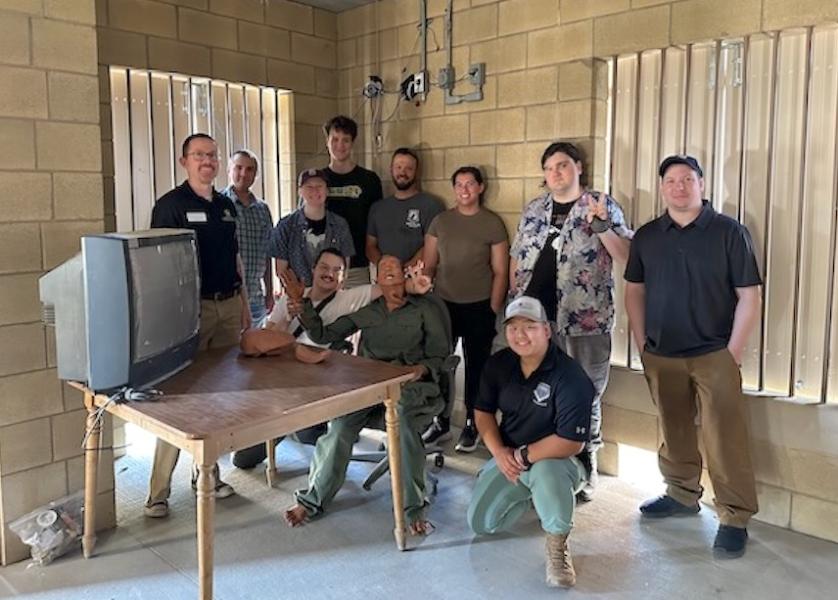Northern Michigan University recently became the first higher education collaborator in the 12-year history of Northern Strike, one of the Department of Defense's largest joint military readiness exercises held at the largest National Guard training facility in the country. Eight NMU information assurance/cyber defense students had a rare opportunity to work alongside military cybersecurity teams from the U.S. and NATO ally Latvia Aug. 11-12. Their mission was to regain control of a network used for communications and war command that had been compromised by a foreign adversary, determine how the network was infiltrated and remediate the vulnerability.
“Northern Strike was a once-in-a-lifetime experience,” said participating student Becca Tatun. “On the second day, I got to work hands-on with a group attempting to defend its network. It was brilliant to see how the unit operated and managed a network in a simulated environment. I was also able to make an abundance of connections while on the base, both with our U.S. troops and with the Latvians. I truly appreciate all that Northern and the U.P. Cybersecurity Institute (UPCI) on campus did to make this opportunity a reality.”
Northern Strike 24-2 took place at Camp Grayling's National All-Domain Warfighting Center. This year's summer iteration of the annual exercise incorporated training scenarios involving homeland security and defense against unmanned aerial systems.
“I was impressed by our students' ability to analyze the situation, think critically and stay positive,” said Professor Jim Marquardson, who along with UPCI Director Michael Sauer accompanied the students. “I'm proud of the way our students represented Northern and demonstrated the hands-on skills our cybersecurity curriculum emphasizes. We were unsure what scenario our students would face, so we had to work collaboratively to solve several challenges. The National Guard was a great host and we felt very welcomed. I look forward to participating again next year.”
“The idea for Northern's participation was formed during U.S. Rep. Elissa Slotkin's tour of the UPCI last February,” Sauer said. “She is a former CIA officer who served three tours in Iraq and held defense and intelligence positions under Presidents Bush and Obama. She has strong connections to the U.S. intelligence and military communities. Rep. Slotkin brought up the idea during her campus visit and then paved the way to make it happen.”
Sauer said a follow-up visit to Slotkin's D.C. office by NMU President Brock Tessman and Deanna Hemmila, executive director of Board and Government Relations, firmed up the details and put him in contact with the military resources required to approve the students' participation.
The scenario included the following components:
- U.S. ally Gorgon (Ukraine) is occupied by a hostile country, Donovia (Russia).
- The U.S. is assisting the Gorgon troops in retaking a key piece of critical infrastructure in a government building, which will be re-taken through an infantry assault.
- During the mission's planning, the Gorgons indicated that they have security cameras in the building, which can provide real-time intel on hostile occupying forces.
- Donovia has taken control of the network infrastructure since occupation.
- Allied cybersecurity teams are tasked with re-taking the network and security cameras to provide a live video feed to the special forces assault team. The intelligence will provide a battlefield advantage and limit potential casualties during the assault.
On the first day, NMU students were tasked with being the red (friendly) team and taking control of the security cameras. They used network sniffing and decompiling tools to determine the handshake between the camera client application and the cloud-based Application Programming Interface (API). They also documented the authentication architecture, but were unable to take control of the camera using a brute-force password attack through the API. However, on the morning of Day 2, the NMU team was able to gain access to the cameras and provide a video data feed.
During the remainder of Day 2, the red and blue (hostile) teams switched sides, so each was able to practice offensive and defensive security skills. The NMU team split up and worked alongside the military red and blue teams. In the afternoon, the teams visited the building in the urban combat range, where the security cameras and simulated ground operation took place. In a unique learning opportunity, NMU students observed the ground troops perform the operation that the intelligence from the cybersecurity operation supported.
After the cybersecurity mission was completed, NMU was invited to a barbecue with troops from the 172nd Cyber Protection Team and the Latvian Cybersecurity Team. The NMU students and Latvian forces were given 172nd Cyber Operation insignia patches for their participation in the exercise.
"The exercise gave us the chance to not only learn about how the Guard handles cybersecurity, but also make important connections for a possible future career in defense and cyber operations,” said NMU student Jef Leroux. “Being part of both red and blue team simulations provided invaluable hands-on experience in offensive and defensive cyber tactics. Observing National Guard soldiers in action highlighted the real-world applications of what we were learning, and gave me a greater appreciation of the critical role cybersecurity plays in modern defense strategies."
Northern Michigan is an ideal spot for the varied missions of the event because it offers land, maritime, air, space and cyberspace training.
"We're able to train all five domains of warfare at the same time," said Col. Todd Fitzpatrick, Northern Strike's land director, in a media report. “Northern Strike is unique, not only because of the integration of defense innovators and academia, but because the exercise reflects the changes service members are seeing on the modern battlefield.”
The NMU College of Business and funds from the MI-LEO Marshall Plan grant covered the travel costs associated with NMU's participation. In addition to Tatun and Leroux, other students who took part in the mission were: Lucas Carlson, Concettina Keech, Dylan Messina, Jake Ritzer, Ryan Tackett and Harkin White.
Learn more about Northern's information assurance/cyber defense program here, and about the U.P. Cybersecurity Institute here.

